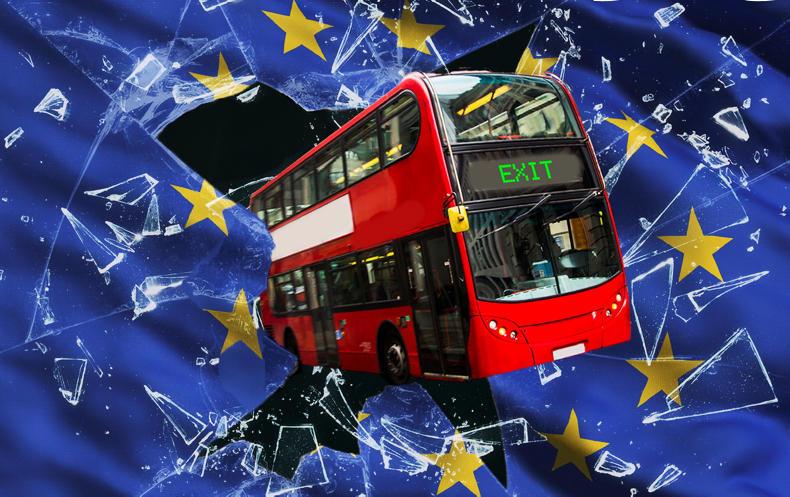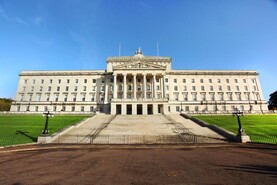A divided House of Commons prepares to vote on the UK's withdrawal agreement with the EU this Tuesday evening.
For MPs who are committed to breaking all ties with the EU, the agreement doesn’t go far enough and retains too many links.
Of particular issue is the acceptance that Northern Ireland would retain access and adhere to EU rules if there was no long-term deal agreed between the EU and UK – the so-called backstop.
This is particularly controversial with the DUP members, who believe this undermines Northern Ireland’s constitutional position as part of the UK.
Clean break
As well as a group of MPs wanting a cleaner break with the EU, there are also MPs who will likely vote against the withdrawal agreement because they don’t want any break with the EU at all.
Instead, they want a second referendum on membership.
To complicate the matter further, there is also a huge division within the political parties and a growing cross-party movement that has ambitions of stopping Brexit completely.
PM doesn’t have the numbers
The government has lost a number of votes in parliament and Theresa May’s authority is considerably weakened.
The fact that she survived a confidence vote within her own party means that she cannot be challenged for the leadership for another year.
The main opposition Labour party could call a vote of confidence in parliament. If Prime Minister May lost that vote, this would mean a general election.
However, it is difficult to see how a change of government could make any difference, as Brussels is adamant that there will be no renegotiation of the withdrawal agreement.
EU assurance
If parliament votes against the withdrawal agreement on Tuesday night, the prime minister is required to bring the issue back again to parliament within three days.
Again, it is difficult to visualise what might change over three days that would turn opinions.
The President of the European Council Donald Tusk and Commission President Jean Claude Junker sent a five-page letter to the prime minister offering assurances on a future trade deal and a desire to never need the backstop.
While the sentiment is strong, it doesn’t change the withdrawal agreement and, therefore, is unlikely to have much impact.
Options if PM loses the vote
It gets really difficult to anticipate what might happen if the prime minister loses the vote for a second time.
Just about every option on Brexit then comes into play, such as:
The government falls and a general election follows. If Labour forms the next government, they want to renegotiate the withdrawal agreement. There won't be sufficient time for a new negotiation. There is an option to delay the departure date, subject to the remaining 27 EU member states agreeing. Easy to do for a few months; more difficult to go beyond that.A second referendum could be called and the UK could unilaterally withdraw its notice to quit (Article 50).If no proposal can get approval in parliament, the UK will leave the EU on 29 March and commence trade with EU members as a third country under WTO rules. Read more
Use intervention and private storage against Brexit – Fitzmaurice
We want Irish cheese – Boris Johnson
Watch: Brexit challenge in border bureaucracy
A divided House of Commons prepares to vote on the UK's withdrawal agreement with the EU this Tuesday evening.
For MPs who are committed to breaking all ties with the EU, the agreement doesn’t go far enough and retains too many links.
Of particular issue is the acceptance that Northern Ireland would retain access and adhere to EU rules if there was no long-term deal agreed between the EU and UK – the so-called backstop.
This is particularly controversial with the DUP members, who believe this undermines Northern Ireland’s constitutional position as part of the UK.
Clean break
As well as a group of MPs wanting a cleaner break with the EU, there are also MPs who will likely vote against the withdrawal agreement because they don’t want any break with the EU at all.
Instead, they want a second referendum on membership.
To complicate the matter further, there is also a huge division within the political parties and a growing cross-party movement that has ambitions of stopping Brexit completely.
PM doesn’t have the numbers
The government has lost a number of votes in parliament and Theresa May’s authority is considerably weakened.
The fact that she survived a confidence vote within her own party means that she cannot be challenged for the leadership for another year.
The main opposition Labour party could call a vote of confidence in parliament. If Prime Minister May lost that vote, this would mean a general election.
However, it is difficult to see how a change of government could make any difference, as Brussels is adamant that there will be no renegotiation of the withdrawal agreement.
EU assurance
If parliament votes against the withdrawal agreement on Tuesday night, the prime minister is required to bring the issue back again to parliament within three days.
Again, it is difficult to visualise what might change over three days that would turn opinions.
The President of the European Council Donald Tusk and Commission President Jean Claude Junker sent a five-page letter to the prime minister offering assurances on a future trade deal and a desire to never need the backstop.
While the sentiment is strong, it doesn’t change the withdrawal agreement and, therefore, is unlikely to have much impact.
Options if PM loses the vote
It gets really difficult to anticipate what might happen if the prime minister loses the vote for a second time.
Just about every option on Brexit then comes into play, such as:
The government falls and a general election follows. If Labour forms the next government, they want to renegotiate the withdrawal agreement. There won't be sufficient time for a new negotiation. There is an option to delay the departure date, subject to the remaining 27 EU member states agreeing. Easy to do for a few months; more difficult to go beyond that.A second referendum could be called and the UK could unilaterally withdraw its notice to quit (Article 50).If no proposal can get approval in parliament, the UK will leave the EU on 29 March and commence trade with EU members as a third country under WTO rules. Read more
Use intervention and private storage against Brexit – Fitzmaurice
We want Irish cheese – Boris Johnson
Watch: Brexit challenge in border bureaucracy






 This is a subscriber-only article
This is a subscriber-only article










SHARING OPTIONS: